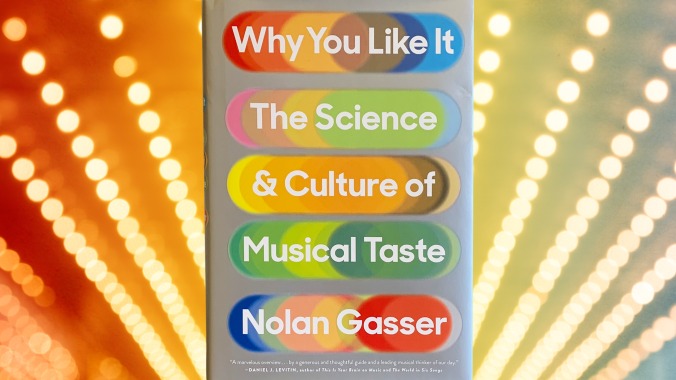From a Pandora musicologist, Why You Like It sorts music fans into dull stereotypes

If video killed the radio star, as The Buggles sang 40 years ago, it might be said that Pandora and its digital streaming ilk exhumed terrestrial radio’s corpse and sucked any remaining sustenance from its desiccated bones. Pandora, if you’re not one of its 70 million monthly users, provides a “highly-personalized listening experience,” according to its website, a radio station created exclusively for you. Love Adele, you say? Let Pandora introduce you to Ed Sheeran, Amy Winehouse, and Bruno Mars. Can’t get enough of the Rolling Stones? Have you checked out Led Zeppelin? Jimi Hendrix? The Doors?
Credit this internet sorcery to the Music Genome Project, the HAL 9000 to Pandora’s Discovery One. First devised in 2000, the MGP’s algorithm endeavors to define an individual’s “musical genotype”—one’s personal taste in music. In Nolan Gasser’s Why You Like It, the MGP’s architect and Pandora’s chief musicologist ventures to help readers “understand and empower” their musical genotypes, to aid listeners to listen to music better.
For Gasser, empowerment means not only showcasing how the MGP works—at least in theory—but surveying the latest scientific, sociological, and psychological research about our relationship with music, in addition to explaining the individual components that make music musical (melody, harmony, rhythm, form, and sound). That’s a whole lot of understanding to foist upon an audience, but fortunately Gasser has 600-plus pages to work with. Unfortunately, chapters alternate between enlightening (the sections on anthropology and neuroscience) and sloggy (on several occasions, Gasser writes something to the effect of “I sense your eyes glazing”).
For those looking to learn how the digital streaming sausage is made, Why You Like It offers little insight. Instead of providing actual examples on how the MGP works—presumably due to proprietary software, user privacy, and all that jazz—Gasser invents “seven fictional music lovers” to match each of the seven genotypes (pop, rock, jazz, hip-hop, EDM, world, and classical). “When it comes to musical taste,” he writes, “no one need be a stereotype.” But that’s exactly what he provides, typecast listeners: Subject one listens to pop, subject two loves rock, subject three bops along to jazz, etc.
Gasser further simplifies the playlist for each imaginary subject by devising a list of four songs, always three obvious choices and one subtle outlier. Subject four, for example, is a hip-hop head who listens to Snoop Dogg’s “Gin & Juice” at the gym, Kendrick Lamar’s “i” en route to work, Eminem’s “Lose Yourself” when returning home, and, while enjoying a night out, Earth, Wind & Fire’s “Shining Star.” Before sharing what insights we might garner from this playlist—besides the fact that it belongs to the least interesting person on planet Earth—Gasser fills page after page with a pedestrian history of the genre (“hip-hop and rap music reflect the experience of young, urban, working-class African-Americans”), prosaic biographies of each artist (“Calvin Cordozar Broadus Jr. earned the nickname ‘Snoopy’ when his mom spotted a resemblance to the cute Peanuts character”), and an esoteric song analysis that might make Dr. Dre dizzy (“The resulting harmony is likewise chromatic, a two-bar progression of F minor—E♭ minor 11/G♭, where the Cs act as a kind of pedal point. Technically, this progression can be labeled as a kind of diatonic variant of the ‘minor Phrygian’ mode”).
In the end, Gasser concludes that subject four is a “relatively older hip-hop fan” who gravitates toward mainstream artists and hit songs with “broad melodic, harmonic, formal, and sonic… elements.” Not only are these insights mind-numbingly obvious, they are what researchers call dry-labbing, the use of fictional but plausible results in lieu of performing an actual experiment.
So why do we like it? Do lyrics not matter? Did our parents, siblings, and friends’ playlists not affect our own? Does sex not sell singles (as well as concert tickets and YouTube clicks)? Can we simply slide ourselves into a fixed genotype?
Thirty-five years ago, another band offered an alternative to the death of the radio star. “All we hear is radio ga ga / Radio goo goo / …Radio blah blah,” Queen’s Roger Taylor wrote, echoing The Buggles, before shifting in a more positive direction: “You had your time, you had the power / You’ve yet to have your finest hour.” Despite Taylor’s wishes, terrestrial radio’s finest hour has likely passed. Digital radio is here to stay, but Nolan Gasser fails to make the case that the Music Genome Project is the way forward.